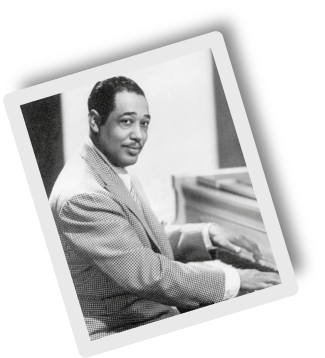




One of music's most influential artists, Duke Ellington, wrote many noteworthy works, but only one big band symphony, Black, Brown and Beige. This groundbreaking piece of music has a powerful cultural message - the story of the American Negro.
Only performed in its entirety at its premiere 70 years ago, this groundbreaking piece will be performed by the Amsterdam Conservatory Concert Band under the direction of world-renowned conductor David Berger.
In his essay "Bardland: Shakespeare in Ellington's World," Jack Chambers explains that the four sonnets in Such Sweet Thunder, Sonnet for Caesar, Sonnet for Hank Cinq, Sonnet for Sister Kate, and Sonnet in Search of a Moor (all composed by Ellington) are, literally, Shakespearean sonnets transliterated into music. They are through-composed and last exactly 28 bars. The melodies are recited in their entirety by one instrumentalist. In all four sonnets, every even-numbered bar ends with a tied note, and the last eight bars are played over stop-time rhythm and sustained chords. The melodies are played once only and last a little more than a minute, though the recorded versions vary from 1:24 to 3:00 depending upon their orchestral setting. Shakespearean sonnets comprise 14 lines divided into three quatrains and a final couplet. The lines must be iambic pentameter (five feet of alternating weak and strong stresses), and they must rhyme alternately until the final couplet, which rhymes successively.
Ellington takes this rigid literary form and renders it into a rigid musical form that matches it point for point. Ellington varies the mood of the four sonnets, but mood is indicated mainly by the orchestral accompaniment rather than by the sonnet soloists, who obviously have enough to contend with making sure the accents fall on 2 and 4 (the strong iambic syllables), sustaining notes at the end of every second bar (equivalent to the rhyme-words), and raising the range over stop-time and/or suspended chords in the last four bars (25-28), the counterpart of the rhyming couplet.
Playing the music under all these constraints is a challenge, even for Ellington's virtuoso soloists, and the tension is clearly audible in all four sonnets. It accounts for a large part of the esthetic delight. The sonnets as Ellington conceives them are small marvels of technical brilliance, atmospheric and eccentric, fresh and somehow unexpected even after numerous listenings. They have delighted two generations of listeners whether or not they knew (or cared) about the precision with which Ellington transliterated the literary form. Townsend, in his liner note, simply says that "they are scored to coincide with the fourteen-line sonnet form," and lets it go at that. Rightly so, in one sense. But it surely adds another twist to Ellington's genius, an unexpected one, to see how masterfully he succeeded in transposing one art form to another. In his sonnets, he really succeeded in writing "Music in Iambic Pentameter."
Go to this link for the unissued world première (on radio) of the Shakespearean Suite CBS broadcast from concert at Ravinia Park Festival, Highland Park, IL. July 1, 1957.